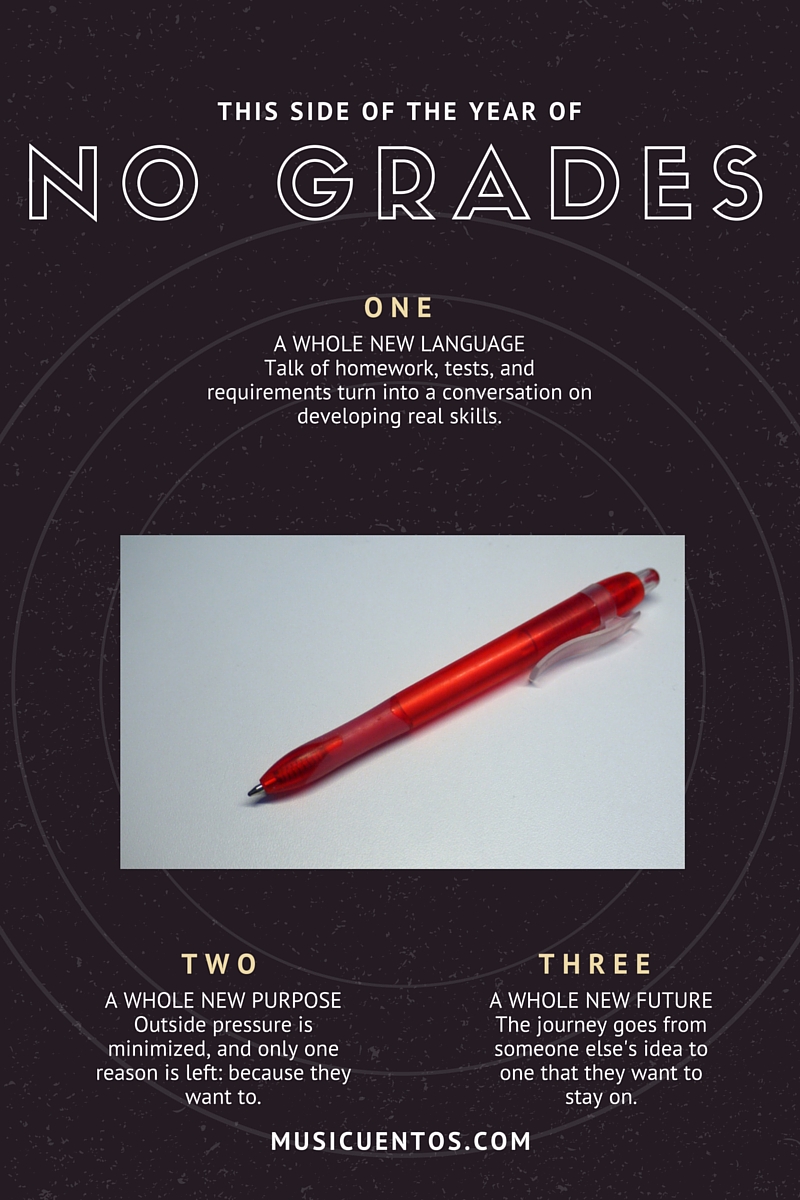Here’s a question for your summer: Can you dare to go YONG?

At the end of the 2013-2014 school year, I was finishing a seven-year stint at a particular school. In a nutshell, the school had a new administrator that year and had swung from what some might call a little too much chaotic familiarity to what some might call an environment where fun was a precious commodity. Here was the grading environment:
- 16 “daily” grades required per quarter
- one to two (recommended) test grades per quarter
- daily grades count as 50% and the test grades as 50% of quarter grade
- first quarter counts as 45%, second quarter as 45%, and final exam as 10% of semester grade
- It was strongly suggested that all subjects give an “academic” final exam (Scantron was mentioned), including art and world language, with a hint that this would be required in future years.
My job, teaching AP Spanish, was phased out at the end of that year due to lack of student interest (drill and kill in Spanish 1 and 2 will do that to a school- the “kill” refers to motivation). And so I didn’t quit and I didn’t get fired, but the school and I parted ways. After a teaching break of a year being Mom + Musicuentos, I partnered with a local homeschool cooperative to begin teaching again.
In some ways, it’s a difficult challenge: I have 60 to 90 minutes per week, once a week, with my students. I teach in a shared space I have to leave exactly how I found it every week, which made me develop some interesting set-up techniques (the shower-curtain word wall, for example). In many other ways, it’s a teacher’s dream that makes my heart happy: motivated learners, small class sizes, involved parents (like a mom or two usually sitting IN CLASS), total freedom in curriculum design, and the final hurdle that was keeping me, in my opinion, from being a truly progressive, future-minded teacher: no grades.
As I reflect on what this change meant, here are three ways the YONG changed our class me.
A whole new language
I mean, a new language besides the one that’s the overt goal. When you’re in the YONG, it’s stunning the things you don’t ever talk about:
- Homework is not a word. We talk about out-of-class activities.
I posted these activities on Edmodo once a week. They were optional. (Yes, you read that right.) - GPA – not an issue. I had a couple of parents bring up the word transcript once, in the context of how many “years” of seat time they could count the class for on transcripts for college applications – you know, because postsecondary institutions have us so well trained to focus on seat time.
- The concept of due changes completely. Deciding when and how to complete activities becomes a collaborative conversation.
- The question of “What do I do to get a higher grade?” was never uttered. Here’s what I heard instead:
“Do you think I’m getting close to Novice High?”
“I’m nervous about this assessment but I think I’m ready to show Novice High on it.“ - The biggest change? Silence. I can’t even tell you much more about what traditional language changed to what proficiency-based language. The biggest change was that questions about how much to complete, what kind of answer was required, how many uses of X feature, what went wrong on an assessment, simply disappeared. This was particularly evident in my younger class with children ages 6 to 12. They just came in every week ready to experience whatever it was we were going to do that day. Ready to explore new real skills, because getting an A is not one of those.
A whole new purpose

Here’s a test of what your purpose and theirs is: when talking about “failing” a class or assessment isn’t an option, you discover that you’re forced to talk about the real purposes for being there, and only those.
Since our out-of-class activities were optional, I’ve been asked how I assessed them or what the purpose of them was. But I was so committed to the YONG that doing anything else wasn’t part of the conversation. And so, when there are no grades to hold over kids’ heads, there are no grades to hold over their heads. They did the activities outside of class if and when they wanted to. But I did keep track of who was completing them. So, what were the results?
- No one student completed every assignment every week.
- No one student didn’t complete any assignments.
- The vast majority completed 3-4 of the 5ish assignments most weeks and had an occasional week when they did none at all and several when they did them all. Sometimes they’d bring it up in class but usually it was a mom who would offer me a reason the child hadn’t done it. Sometimes I’d bring up an assignment if I had a question. Once I talked to a mom about her daughter routinely submitting an assignment with a response of “hi” when I’d asked for more explanation or description of the activity.
Summary: Most of my students interacted with Spanish regularly outside of class for two and only two reasons: 1) because they wanted to and 2) sometimes, because the parents required it.
A whole new future
Do you want to share the statistics on how many students you taught 5 or 10 years ago still have measurable proficiency skills? I do not. I’m guessing my 5-year record would show somewhere in the 20%-30% range from my best years. Is that success? I don’t know. It sure doesn’t feel like it.
I have a sneaking suspicion that our success can be defined not by our end-of-year assessments nor even by retention into upper levels but by how many of our students still have any measurable proficiency in 5-10 years. Researchers can debate whether or not acquisition is permanently stored all they want but I don’t care – what we do know is that language attrition happens, and acquisition is not permanently retrievable (as evidenced by speakers who no longer speak their “native” language). Your brain is efficient, and the old adage may have some touted exceptions but normally proves true: If you don’t use it, you lose it.

But not now, I hope. I’ve never been so optimistic about students developing long-term proficiency. Students and their families are almost without exception asking me what they can do to keep the learning going through the summer! They want to talk about future travel, jobs, friends, and experiences. The future is bright and endless.
Think you can’t go YONG? Can it be done in a school? Why not at least start the conversation? If teachers need further convincing, just think about what you would do with all the time you spend finding or developing, administering, and yes, grading your assessments right now.
And I am not the only one who is suggesting you think about how to “break your classroom’s dependence on the “A-through-F” grading system that does little more than silence student voices.” About how to “stop reducing students to a number, letter, or any label that misrepresents learning and assessment in education.”
I’ll end here by mentioning that for family records and our own information, at our last meeting in each semester I administered one integrated performance assessment. See an example of my early learners’ work on that here. You can check out my secondary assessment for the end of the year here.
Have you taken any steps toward a grades revolution? What’s it been like?
3 Comments
Comments are closed.





in my public school our grading requirements are not explicitly stated but there is a cultural expectation of standard homework, participation and test/quiz grades. I have shifted to performance based assessments in an attempt to shift the conversation away from points and towards proficiency. I have students complete participation SELF assessments to reinforce what I believe are the behaviors most likely to lead to success in foreign language learning. I count homework completion as a mere 5% of the final grade, and honestly it seems like too much. I do WAY less grading now than I did earlier in my career and it has made my life and classes more enjoyable. I do think having some kind of final assessment like an IPA is useful to be able to know what students can do. Personally I always pushed myself in language learning whenever I was preparing for some language certification test (AP, DELF/DALF, DELE). I think test prep, if it’s a good test, is a reasonable approach. But the only grade should be one that reflects proficiency, just like in the real world.
Thanks for sharing that with us, Eric!
[…] years to get to your level of contact time.) I assigned at-home activities via Edmodo, but since I didn’t give grades, I really had no leverage except moms pestering them. Everyone did some activities. Some did […]